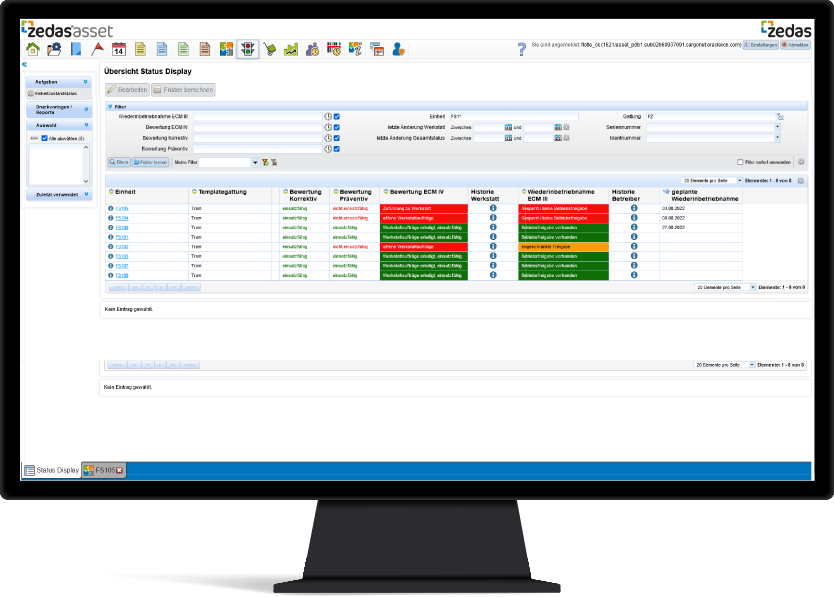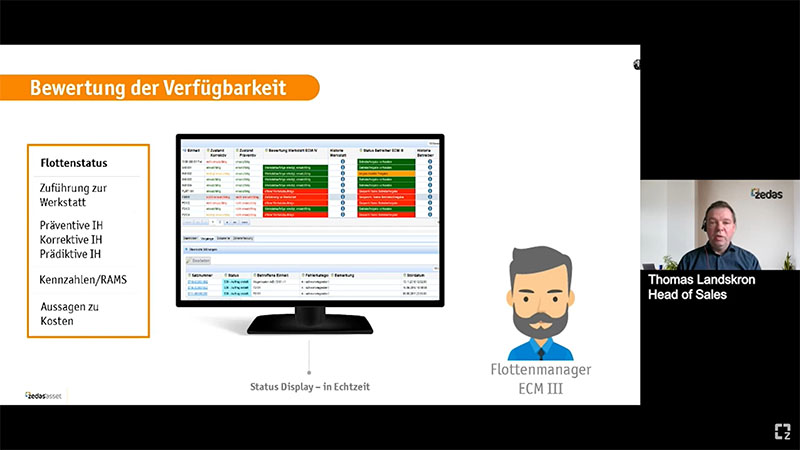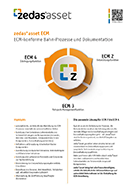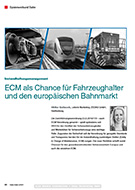
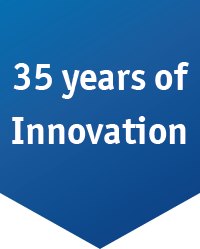

zedas®asset
ECM-compliant railway processes and documentation
ECM functions | ECM 2 | ECM 3 | ECM 4 | Webinar | ECM certification
With zedas®asset you are well equipped to meet the ECM specifications - whether compliance with the processes, the documentation relating to the rail vehicle or the central filing of maintenance strategies and maintenance specifications. zedas®asset guarantees a structured and standardised maintenance process and ensures that rail vehicles are sent for maintenance in good time. In doing so, all ECM roles benefit from a comprehensive and consistent life cycle file of the rail vehicles and components through zedas®asset.
zedas®asset integrates all process participants, increases the safety of rail vehicles and supports companies in complying with the ECM regulation.
- ECM compliant maintenance
- A safe operation
- Audit-proof documentation
- Consistent process support
The most frequently asked questions about ECM Arrange a software demo now
A selection of our clients
Safe operation thanks to maintenance system
Automated, legally compliant handling of the ECM process
Creation of a complete life cycle file of rail vehicles and components
Definition and management of safety-critical components
Carrying out decommissioning, release for operation and recommissioning
Creation of all required protocols and documents for verification purposes
Versioning of maintenance specifications by means of checklists
Management of personnel, resources, skills, if necessary with time-limited validity
Monitoring the certification of commissioned workshops
The right solution for ECM 2 to ECM 4
ECM 2 - Maintenance Development Function
With zedas®asset, all maintenance specifications can be stored, versioned and transferred to the responsible departments for the planning and implementation of maintenance activities.
For the continuous review and further development of the maintenance specifications, all necessary data is available in the life cycle file of the vehicle and the components.
ECM 2 managers benefit from comprehensive and consistent documentation.
Order management and maintenance specifications
Storage and versioning of maintenance specifications
Safety Critical Components
Definition of safety-critical components
Maintenance development
Further development of the specifications on the basis of the life cycle file
ECM 3 - Fleet Maintenance Management Function
zedas®asset clearly displays defects and due dates and reminds you to have rail vehicles serviced on time. Maintenance plans (operations, required resources, checklists) with defined calculation algorithms can be stored for this purpose.
With zedas®asset, ECM 3 managers monitor the certification of the contracted workshops. All important information can be passed on to ECM 2 and ECM 4 at the push of a button.
Documentation
Decommissioning & Recommissioning
Maintenance planning and control
Ensuring delivery to the workshop on time
Traceability and documentation
Complete traceability of all maintenance measures
ECM 4 - Maintenance Delivery Function
zedas®asset guarantees a structured and standardised maintenance process for rail vehicles and components - in accordance with the underlying specifications of ECM 2.
zedas®asset supports ECM 4 managers in the planning, implementation and documentation of all maintenance activities, taking into account the necessary certificates and qualifications for equipment and personnel.
This ensures that the work tasks were performed by an authorised employee and that approved equipment is used.
ECM 4 is responsible for performing maintenance on rail vehicles. Workshops must ensure that the specifications of ECM 2 are met. For this purpose, the workshop must provide evidence of maintenance activities and show operational release documents.
Maintenance specifications
Performing all maintenance services in compliance with applicable specifications
Safety Critical Components
Testing and validation of the Safety Critical Components with their installation position
Operational release and documentation
Creation of the operational release and all required documents
Operating resources management
Monitoring of test cycles, deadlines and approvals for tools and equipment used in the maintenance process
Human Resources Management
Management and monitoring of skills, certificates and qualifications including their validities
Book a software demo now!
Take the chance and book your software demo. Which functions are you interested in and which goals do you want to achieve with zedas®. We will be happy to help you and arrange a desired date with you.
Life cycle file - vehicle and component history
zedas®asset enables object-specific tracking (installation location and component-related) including history and meter data. A complete maintenance history is stored for each object. Performed measures and pending tasks (faults, defects from inspections) are displayed object-related and clearly.
Objects can be named according to the company's own classifications, which significantly improves the clarity of the objects.
Due to the direct, continuous documentation, the file of all maintenance objects is always up to date. This means that inspections/maintenance can be verified in an audit-proof manner without any extra effort.
In addition, evaluations according to a wide range of criteria (costs, performance, reliability, etc.) are available at any time with up-to-date data, which facilitates the analysis of objects and measures.
Do you have questions? I will be happy to help!

Thomas Landskron
Head of Sales
Phone: +49 3573 7075 61
eMail: tlandskron@zedas.com
![]()
Decommissioning, operational Release und Recommissioning
With the help of the status display and the integrated traffic light function, the current operability of each vehicle is immediately visible. Which vehicles are currently ready for operation, blocked or have received an operational release or recommissioning.
The basis for this is the status information of the objects. This includes, for example, relevant maintenance due dates, recorded faults or the status of orders that are being processed in the workshop. Technical information from vehicles can also be evaluated.
After decommissioning, which is triggered either automatically by due dates or by ECM 3, ECM 4 performes the repair. With the help of digital documentation, ECM 3 can trace which work was performed, by which employee and with which equipment. For this purpose, the system creates an operating release protocol according to ECM specifications.
ECM 3 can now release the vehicle on its basis and automatically generate a recommissioning report.
Approvals can only be made by authorised (rights/role concept) users. The approvals and each status change are historised in the system (with user and time stamp) and can be traced at any time.
Safety critical components
Safety critical components are components for which a single failure is directly associated with a realistic risk of a major accident as defined in Article 3(12) of Directive (EU) 2016/798. For the management of safety-critical components, the entity in charge of maintenance shall take into account the vehicle manufacturer's intended use and maintenance instructions. The associated documentation on safety-critical components is an important part of the life cycle file of vehicles and components.
In addition, there is an obligation for ECMs to report "exceptional maintenance findings not due to normal wear and tear" to the railway sector. - Safety Alert System
zedas®asset enables the simple management and documentation of safety-critical components. This includes not only the installation and removal history, but also the recording and monitoring of load data. Any individual counters can be defined for all maintenance objects. Counter readings that are not within the tolerance range are highlighted by traffic lights and are easy for the user to recognise.
Opportunities for operators and maintainers
The first challenge owners and maintainers of freight wagons and locomotives are confronted with is to implement the maintenance management system required by the regulation. This obligation leads to a large number of opportunities for the parties concerned as modern asset management systems for rail vehicles include many functions for the maintenance organization. This means that not only evidence required for ECM certification can be provided, but also higher-ranking maintenance objectives can be achieved.
Examples for such objectives would be:
- Increased reliability of vehicles
- Higher fleet availability
- Reduction of default risks
- Process transparency
- Automated and consequently faster and improved communication
The digitization of maintenance provides the optimal basis for implementing corrective, preventive and predictive maintenance strategies. A digital vehicle history file and detailed component tracking are only possible with the right IT system. The same applies to checklist-based, mobile work on the train or the traceability of maintenance measures. The data in the system is available to authorized personnel at all times, considerably reducing the need for communication by phone and/or e-mail.
Predictive maintenance in particular would be inconceivable without using intelligent IT solutions. Only thanks to such solutions it is possible, for example, to forecast the wear of components (e.g., wheel sets) - and thus to prevent a sudden failure of the according vehicle. True to the motto "forewarned is forearmed".
Example: This is how the documentation of work orders in zedas®asset works
To ensure complete documentation of maintenance work done in the workshop (ECM 4), first of all information on personnel and equipment are managed in the system. Specific time-limited certificates and qualifications can be assigned to personnel. For operating equipment (e.g. measuring devices), clearly identifiable units (e.g. wheelset measuring device, serial number 2483) are created, to which a certificate/proof (e.g. last calibration) can be assigned. Validity and deadlines of certificates can be monitored.
If a workshop employee processes a work order, the equipment used and the personnel performing the work are entered in the job order completion in an audit-proof manner. This documents that the job order was executed by an authorized employee and that valid equipment was used.
Webinar
ECM-compliant documentation and operational release
In this webinar, we will show you how the zedas®asset ECM module enables extended support in providing evidence for ECM-compliant documentation and operational release. With the module, entities responsible for maintenance are optimally equipped for the planning and implementation of maintenance measures.
Webinar "ECM-compliant documentation and operational release"
Overview of the zedas®asset modules
The modular structure of our standard software enables you as an RU, owner, operator or workshop to compile the software according to the requirements of your company.
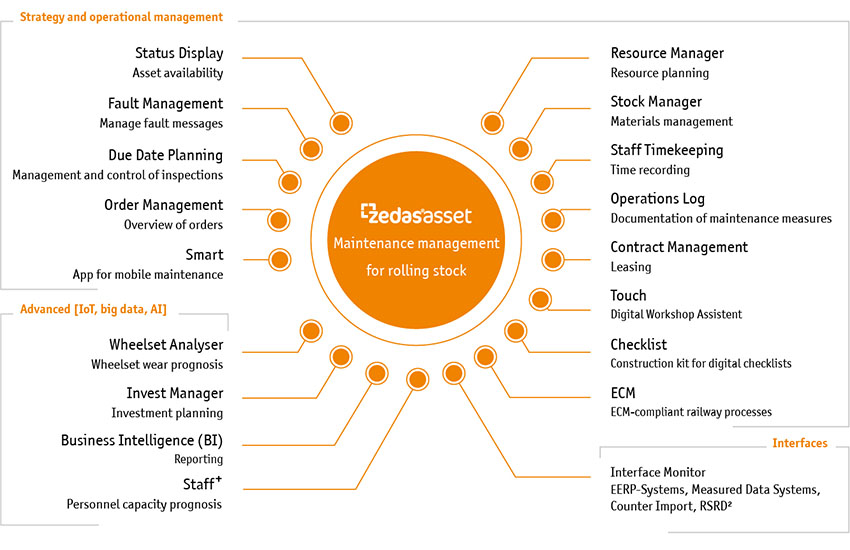
ECM compliant thanks to zedas®asset
zedas®asset is designed to comply with standards and regulations and to provide the
best possible support for all ECM managers.
This means for you:
- A safe operation
- Audit-proof documentation
- Consistent process support
ECM-certification according the regulation (EU) 2019/779
Railways and keepers of railway vehicles must assign an Entity in Charge of Maintenance (ECM) for the maintenance of their railway vehicles in accordance with § 4a AEG. This entity is responsible for the implementation of an instance maintenance management system, which makes a significant contribution to the safety of the railway vehicle and the railway traffic.
The Implementing Regulation (EU) 2019/779 of 16.06.2019 now extends the certification obligation for freight wagons, which has existed since 2011, to all railway vehicles and all ECMs. Certification in accordance with the EU-wide uniform implementing regulation had to take place by 16.06.2022.
Only a few exceptions, for example the maintenance of railway vehicles in the exclusively historical or tourist sector, are not affected by the regulation.
Source, FAQ and further information on the Implementing Regulation (EU) 2019/779 on the website of the Federal Railway Authority
The most frequently asked questions about Entity in Charge of Maintenance
ECM 1 has overall responsibility for the establishment and effectiveness of the maintenance management system and monitors ECM 2 to ECM 4.
ECM 2 creates and manages the maintenance specifications. The specifications are developed further on the basis of the design, performance and operating data. In addition, compliance with standards and legal requirements is their responsibility.
ECM 3 ensures that vehicles are submitted for maintenance on time and are put back into service after maintenance. ECM 3 managers must ensure that only suitable and ECM-certified workshops are commissioned.
ECM 4 is responsible for performing maintenance on rail vehicles. Workshops must ensure that the specifications of ECM 2 are met. For this purpose, the workshop must provide evidence of maintenance activities and show operational release documents.
Each railway vehicle must be assigned to an ECM. If a vehicle is registered in the NVR, the responsible ECM must also be entered.
Each ECM must ensure that the rolling stock it maintains is in a safe operating condition by implementing a maintenance system. This doesn't affects the responsibility of railway undertakings and infrastructure managers for the safe operation of trains.
No, this is not necessary. Railways or keepers have the option of either performing the ECM tasks themselves or transferring the responsibility to a third party ECM. The regulations for the registration of vehicles must be complied with.
When the keeper delegates the ECM tasks to a third party, he remains responsible for ensuring that the vehicles and materials as well as the services comply with the specified requirements and conditions of use so that they can be safely used in operation by the railway undertaking and/or infrastructure manager. Keepers are obliged to take the following actions:
- select a qualified ECM and contract with them,
- ensure that the correct data is reported for the registration of vehicles in the NVR,
- ensure that vehicle maintenance can be performed at the locations and times specified by the ECM,
- inform the ECM of any technical problems and any corrective measures that may be required and arrange for the appropriate action to be taken,
- take concrete steps when the registered ECM's maintenance entity certificate has been suspended or withdrawn and inform the RUs/EIUs involved.
A "freight wagon" is, according to ECM Regulation (EU) 445/2011, a non-self-propelled vehicle intended for the transport of freight or other materials used for activities such as construction or infrastructure maintenance activities.
The European vehicle number is decisive for the classification of the vehicles.
The group of freight wagons includes vehicles whose 12-digit number (known as the standard number) starts with the digits 00 to 09, 10 to 19, 20 to 29, 30 to 39, 40 to 49 or 80 to 89, this number indicating the type of vehicle and its suitability for interoperability.
In principle, RUs and EIUs are expected to use vehicles only for their intended use, i.e. to use them for their intended purpose, taking into account their design characteristics, e.g. for the carriage of passengers or goods or for shunting operations. In this case, the RU or EIU is also registered in the National Vehicle Register as the responsible ECM for the vehicles.
For train movements, the RU or EIU is always the responsible undertaking indicated in the header of the timetable. For shunting, the RU or EIU is also responsible and the driver and shunting staff are assigned to the safety management system of the responsible RU or EIU.
Exceptions apply to vehicles that are only used to clear the route after an accident or for use in the context of technical assistance pursuant to § 4 (3) sentence 1 number 2 AEG.
In contrast to Regulation (EU) No 445/2011, which only applies to freight wagons, the Implementing Regulation (EU) 2019/779 applies to all types of railway vehicles. It establishes a certification system for all ECM and maintenance functions. It also establishes specific requirements for safety critical components (SSC).
According to Article 3(1), all ECMs responsible for vehicles covered by Directive (EU) 2016/798 on railway safety must comply with the requirements of Annex II. This does not take into account possible exemptions from the ECM certification system.
In Germany, this concerns all ECMs responsible for railway vehicles running on the superordinate network according to § 2b AEG.
Yes, there are exceptions for ECM certification in the following cases:
- For ECMs responsible for railway vehicles used exclusively for historical or tourist purposes.
- For ECMs responsible for rolling stock operated on railway infrastructure according to § 2b(1)(1) to (4) and running exclusively to the interchange station of the superordinate network.
In such cases, the entities in charge of the maintenance of these railway vehicles shall establish appropriate arrangements to meet public safety requirements.
Any ECM registered in the scope of the Safety Directive and entered in the National Vehicle Register, as well as any body or organisation performing one or more of the maintenance functions referred to in points (b), (c) and (d) of Article 14(3) of Directive (EU) 2016/798, may apply for ECM certification.
ECM certification is required for all ECMs that are either responsible for the maintenance of freight wagons or that are not RUs or EIUs and only maintain their own vehicles. "Maintaining" in the sense of Regulation (EU) 2019/779 means that the company operates as an ECM and is registered as such in the National Vehicle Register.
Maintenance units responsible for the maintenance of historic or tourist railway vehicles or for the operation of railway infrastructures (according to § 2b(1)(1) to (4)) and which only run as far as the transition station of the superordinate network do not need a maintenance unit certificate.
No, according to Regulation (EU) 2019/779, maintenance workshops are subcontractors of the certified ECM and provide subcontracted maintenance functions. It is the responsibility of the ECM to ensure that the external entities are competent and able to perform the maintenance tasks contracted by the ECM. There are various methods by which the ECM can assess the competence of external bodies. However, external bodies may apply for voluntary certification to provide subcontracted maintenance functions or parts thereof.
No, as of 16.06.2020, Regulation (EU) No 445/2011 is no longer valid. Certificates issued until then will be treated in the same way as the "new" Implementing Regulation (EU) 2019/779 for their original period of validity. This means that holders of such certificates do not have to apply for a new certificate under the new Regulation. This also applies to corresponding certificates for maintenance functions.
ECMs, which are registered and required to establish a maintenance system in accordance with the requirements of the first to third sentences of Article 14(3) of Directive (EU) 2016/798.
Generally, the reporting period is 12 months. This begins two months before the last inspection and ends two months before the next scheduled inspection. The report must be submitted to the certification unit at the latest one month before the next scheduled inspection. In the case of initial certification or recertification, the reporting period is determined analogously.
If monitoring is performed as part of the procedure for granting a safety certificate or authorisation (for RUs/EIUs that are not subject to the certification obligation or are not voluntarily certified), the reporting period is based on the SiBe audits.
Safety critical components are components for which the occurrence of a single failure immediately creates a real risk of a major accident as defined in Article 3(12) of Directive (EU) 2016/798.
A "serious accident" refers to a train collision or derailment in which at least one person is killed or at least five persons are seriously injured or which causes significant damage to rolling stock, infrastructure or the environment. It also refers to other accidents with similar effects which have obvious implications for railway safety regulation or safety management. Significant damage" is estimated by the investigating body as a direct cost of at least EUR 2 million.
If the ECM is an RU / EIU, the Maintenance Entity Certificate offers several benefits:
- The maintenance requirements of Regulation (EU) 2018/798 on common safety methods are fulfilled, resulting in a reduction of effort in the safety certification process. This is about managing the relevant risks related to maintenance and directing the information and communication relevant to the management of fixed assets.
- The ECM is authorised to operate for freight wagons.
- Vehicles for which the ECM has been certified can also be operated by third parties.
- The certified ECM can be registered as an ECM for the vehicles of a third party.
A railway vehicle used exclusively for historical or tourist purposes falls under § 18 of the Railway Construction and Operation Regulations. This means that the vehicle is used to demonstrate or operate historical or special forms of traction technology or rolling stock and is used exclusively for tourist, recreational or educational purposes.
In contrast to commercially operating railways, the purposes of operation of museum and tourist railways are purposes in themselves. The operation of the railway vehicle itself constitutes the actual purpose and not the transport of passengers or goods from A to B. Consequently, the operation of railway vehicles used only for historical or tourist purposes is not intended to make a profit by transporting passengers or goods. Instead, the aim, if any, is only to cover the costs of operating the railway itself. Empty, transfer and workshop journeys are also permitted to fulfil these purposes.






















